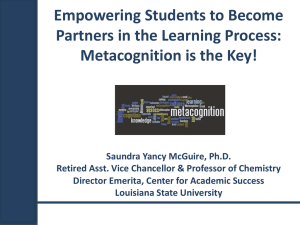how i learn - Association of American Colleges and Universities
advertisement
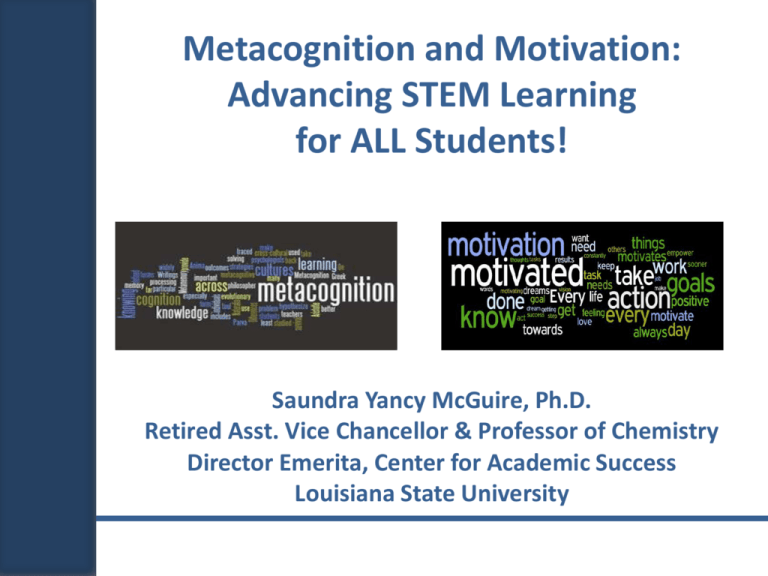
Metacognition and Motivation: Advancing STEM Learning for ALL Students! Saundra Yancy McGuire, Ph.D. Retired Asst. Vice Chancellor & Professor of Chemistry Director Emerita, Center for Academic Success Louisiana State University Transforming STEM Education: Inquiry, Innovation, Inclusion, and Evidence will bring together… STEM faculty and academic leaders… to share innovations, evidence, and practical strategies for succeeding in the dual STEM challenges of: Reversing the dramatic U.S. loss of needed talent in STEM disciplines, using evidence-based practices that increase persistence and achievement for all students Ensuring that all STEM graduates build--from the outset of their studies--the multi-disciplinary knowledge, research skills, and mindsets needed to address the complex challenges to be faced in every sphere of society. Desired outcomes We will understand why many STEM students do not know how to learn We will have concrete learning strategies that faculty can teach students to increase learning We will have more resources for our students We will view our students differently We will see positive changes in our students’ performance and self-perception We will understand how metacognition and increased motivation increase student success Metacognition The ability to: think about one’s own thinking be consciously aware of oneself as a problem solver monitor, plan, and control one’s mental processing (e.g. “Am I understanding this material, or just memorizing it?”) accurately judge one’s level of learning Flavell, J. H. (1976). Metacognitive aspects of problem solving. In L. B. Resnick (Ed.), The nature of intelligence (pp.231-236). Hillsdale, NJ: Erlbaum Why haven’t most students developed metacognitive skills? According to data from the entering class of 2011...* • It wasn’t necessary in high school - 60.5% of 2011 (down from 63% in 2010) entering first year students spent less than six hours per week doing homework in 12th grade. - 49.7% of these students said they graduated from high school with an “A” average.* • Students’ confidence level is high - 70.9 % believe their academic ability is above average or in the highest 10 percent among people their age *2011 Higher Education Research Institute Study Faculty Must Help Students Make the Transition to College Help students identify and close “the gap” current behavior current grades productive behavior desired grades Turn Students into Expert Learners: Teach Them Metacognitive Learning Strategies! Reflection Questions • What’s the difference, if any, between studying and learning? • For which task would you work harder? A. Make an A on the test B. Teach the material to the class The Story of Two Students Travis, junior psychology student 47, 52, 82, 86 B in course Dana, first year physics student 80, 54, 91, 97, 90 (final) A in course Travis, junior psychology student 47, 52, 82, 86 Problem: Reading Comprehension Solution: Preview text before reading* Develop questions* Read one paragraph at a time and paraphrase information *Develop anticipatory set Christopher Columbus Discovering America WITH HOCKED GEMS FINANCING HIM/ OUR HERO BRAVELY DEFIED ALL SCORNFUL LAUGHTER/ THAT TRIED TO PREVENT HIS SCHEME/ YOUR EYES DECEIVE/ HE HAD SAID/ AN EGG/ NOT A TABLE/ CORRECTLY TYPIFIES THIS UNEXPLORED PLANET/ NOW THREE STURDY SISTERS SOUGHT PROOF/ FORGING ALONG SOMETIMES THROUGH CALM VASTNESS/ YET MORE OFTEN OVER TURBULENT PEAKS AND VALLEYS/ DAYS BECAME WEEKS/ AS MANY DOUBTERS SPREAD FEARFUL RUMORS ABOUT THE EDGE/ AT LAST/ FROM NOWHERE/ WELCOME WINGED CREATURES APPEARED/ SIGNIFYING MOMENTOUS SUCCESS Dooling, J.D. and Lachman, R. Effects of Comprehension on Retention of Prose, Journal of Experimental Psychology, (1971), Vol. 88, No. 2, 216-222 Anticipatory set CAN interfere! Let’s look at the car on the next slide… Dana, first year physics student 80, 54, 91, 97, 90 (final) Problem: Memorizing formulas and using www.cramster.com Solution: Solve problems with no external aids and test mastery of concepts Why the Fast and Dramatic Increase? It’s all about the strategies, and getting them to engage their brains! Counting Vowels in 45 seconds How accurate are you? Count all the vowels in the words on the next slide. Dollar Bill Dice Tricycle Four-leaf Clover Hand Six-Pack Seven-Up Octopus Cat Lives Bowling Pins Football Team Dozen Eggs Unlucky Friday Valentine’s Day Quarter Hour How many words or phrases do you remember? Let’s look at the words again… What are they arranged according to? Dollar Bill Dice Tricycle Four-leaf Clover Hand Six-Pack Seven-Up Octopus Cat Lives Bowling Pins Football Team Dozen Eggs Unlucky Friday Valentine’s Day Quarter Hour NOW, how many words or phrases do you remember? What were two major differences between the two attempts? 1. We knew what the task was 2. We knew how the information was organized Bransford, J.D., Brown, A.L., Cocking, R.R. (Eds.), 2000. How people learn: Brain, Mind, Experience, and School. Washington, DC: National Academy Press. What we know about learning • Active learning is more lasting than passive learning -- Passive learning is an oxymoron* • Thinking about thinking is important – Metacognition** • The level at which learning occurs is important – Bloom’s Taxonomy*** *Cross, Patricia, “Opening Windows on Learning” League for Innovation in the Community College, June 1998, p. 21. ** Flavell, John, “Metacognition and cognitive monitoring: A new area of cognitive– developmental inquiry.” American Psychologist, Vol 34(10), Oct 1979, 906-911. *** Bloom Benjamin. S. (1956). Taxonomy of Educational Objectives, Handbook I: The Cognitive Domain. New York: David McKay Co Inc. Bloom’s Taxonomy Anderson & Krathwohl, 2001 http://projects.coe.uga.edu/epltt/index.php?title=Bloom's_Taxonomy Bloom’s Taxonomy Making judgments based on criteria and standards through checking and critiquing. This pyramid depicts the different levels of thinking we use when learning. Notice how each level builds on the foundation that precedes it. It is required that we learn the lower levels before we can effectively use the skills above. Creating Evaluating Analyzing Carrying out or using a procedure through executing, or implementing. Breaking material into constituent parts, determining how the parts relate to one another and to an overall structure . Applying Understanding Retrieving, recognizing, and recalling relevant knowledge from long-term memory. Putting elements together to form a coherent or functional whole; reorganizing elements into a new pattern or structure through generating, planning, or producing. Constructing meaning from oral, written, and graphic messages through interpreting, exemplifying, classifying, summarizing, inferring, comparing, and explaining. Remembering http://www.odu.edu/educ/llschult/blooms_taxonomy.htm When we teach students about Bloom’s Taxonomy… They GET it! How students answered (2008) At what level of Bloom’s did you have to operate to make A’s or B’s in high school? 1. 2. 3. 4. 5. 6. Knowledge Comprehension Application Analysis Synthesis Evaluation 35% 25% 21% 13% 1 2 3 4 3% 3% 5 6 How students answered (2013) At what level of Bloom’s did you have to operate to make A’s or B’s in high school? 44% 1. 2. 3. 4. 5. 6. Knowledge Comprehension Application Analysis Synthesis Evaluation 29% 21% 4% 2% 0% 1 2 3 4 5 6 How students answered (in 2008) At what level of Bloom’s do you think you’ll need to be to make an A in Chem 1201? 1. 2. 3. 4. 5. 6. Knowledge Comprehension Application Analysis Synthesis Evaluation 35% 23% 15% 14% 7% 6% 1 2 3 4 5 6 How students answered (in 2013) At what level of Bloom’s do you think you’ll need to be to make an A in Chem 1201? 1. 2. 3. 4. 5. 6. Knowledge Comprehension Application Analysis Synthesis Evaluation 40% 23% 11% 11% 9% 6% 1 2 3 4 5 6 How do we teach students to move higher on Bloom’s Taxonomy? Teach them the Study Cycle* *adapted from Frank Christ’s PLRS system The Study Cycle 344 Reflect Review Reflect Preview Preview before class – Skim the chapter, note headings and boldface words, review summaries and chapter objectives, and come up with questions you’d like the lecture to answer for you. Attend Attend class – GO TO CLASS! Answer and ask questions and take meaningful notes. Review Review after class – As soon after class as possible, read notes, fill in gaps and note any questions. Study Assess Study – Repetition is the key. Ask questions such as ‘why’, ‘how’, and ‘what if’. • Intense Study Sessions* - 3-5 short study sessions per day • Weekend Review – Read notes and material from the week to make connections Assess your Learning – Periodically perform reality checks • Am I using study methods that are effective? • Do I understand the material enough to teach it to others? Intense Study Sessions Decide what you want to accomplish in your study session 1 Set a Goal 2 Study with Focus 30-50 min Interact with material- organize, concept map, summarize, process, re-read, fill-in notes, reflect, etc. 3 Reward Yourself 10-15 min Take a break– call a friend, play a short game, get a snack 4 Review 1-2 min 5 min Go over what you just studied Center for Academic Success B-31 Coates Hall ▪ 225.578.2872 ▪www.cas.lsu.edu Metacognitive Get Acquainted Activity* • What do you believe is important to understand and learn in _____________________? • What do you believe to be critical characteristics of successful students in ___________? • How will you study and prepare for exams in ______________________________? *Simpson, M. & Rush, L. (2012) in Teaching Study Strategies in Developmental Education, Hodges, Simpson, Stahl eds. New York: Bedford/St. Martin’s Two Valuable References Gabriel, Kathleen F. (2008) Teaching Unprepared Students. Sterling, VA: Stylus Publishing Nilson, Linda. (2013) Creating Self-regulated Learners Sterling, VA: Stylus Publishing February 7, 2010 Chronicle of Higher Education How Students Can Improve by Studying Themselves Researchers at CUNY's Graduate Center push 'self-regulated learning' Grazyna Niezgoda, a math instructor at New York City College of Technology, says most students eventually appreciate the new methods. Help Students Develop the Right Mindset Dweck, Carol, 2006. Mindset: The New Psychology of Success. New York: Random House Publishing Shenk, David, 2010. The Genius in All of Us: Why Everything You've Been Told About Genetics, Talent, and IQ Is Wrong. New York: Doubleday Mindset* is Important! Fixed Intelligence Mindset Intelligence is static You have a certain amount of it Growth Intelligence Mindset Intelligence can be developed You can grow it with actions Dweck, Carol (2006) Mindset: The New Psychology of Success. New York: Random House Publishing Responses to Many Situations are Based on Mindset Fixed Intelligence Mindset Response Growth Intelligence Mindset Response Challenges Avoid Embrace Obstacles Give up easily Persist Tasks requiring effort Fruitless to Try Path to mastery Ignore it Learn from it Threatening Inspirational Criticism Success of Others Email from a Spring 2011 General Chemistry Student “…Personally, I am not so good at chemistry and unfortunately, at this point my grade for that class is reflecting exactly that. I am emailing you inquiring about a possibility of you tutoring me.” April 6, 2011 --------------------------------------------------------------------------------------------------------------------------------------------“I made a 68, 50, (50), 87, 87, and a 97 on my final. I ended up earning a 90 (A) in the course, but I started with a 60 (D). I think what I did different was make sidenotes in each chapter and as I progressed onto the next chapter I was able to refer to these notes. I would say that in chemistry everything builds from the previous topic. May 13, 2011 Semester GPA: 3.8 What happens when we teach metacognitive learning strategies, Bloom’s Taxonomy, and the Study Cycle to an entire class, not just individuals? Performance in Gen Chem I in 2011 Based on One Learning Strategies Session Exam 1 Avg.: Exam 2 Avg.: Final course Avg*.: Final Course Grade: Attended 71.65% 77.18% 81.60% Absent 70.45% 68.90% 70.43% B C The one 50-min presentation on study and learning strategies resulted in an improvement of one full letter grade! Metacognition: An Effective Tool to Promote Success in College Science Learning* Ninfeng Zhao1, Jeffrey Wardeska1, Saundra McGuire2, Elzbieta Cook2 1Department of Chemistry, East Tennessee State University 2Department of Chemistry, Louisiana State University *Accepted for publication April 2013 Motivation “Motivation refers to the personal investment an individual has in reaching a desired state or outcome. (Ambrose et. al, 68) “In the academy, the term ‘motivating’ means stimulating interest in a subject and, therefore, the desire to learn it.” (Nilson, 57) Ambrose, S.A., Bridges, M.W., DiPietro, M., Lovett, M.C., Norman, M.K. (2010) How Learning Works: Seven Research-Based Principles for Smart Teaching. San Francisco, CA: Jossey Bass. Three Important Levers that Influence Motivation Value – the importance of a goal (attainment, intrinsic, instrumental) Supportive Nature of the Environment – the instructor is approachable, support is available from peers and others Efficacy Expectancies – the belief that one is capable of identifying, organizing, initiating, and executing a course of action that will bring about a desired outcome Ambrose et al., 80 Sharing Strategies that Have Worked for Others Can Be Very Motivational Top 5 Reasons Folks Did Not Do Well on Test 1 in General Chemistry 1. Didn’t spend enough time on the material 2. Started the homework too late 3. Didn’t memorize the information I needed to memorize 4. Did not use the book 5. Assumed I understood information that I had read and re-read, but had not applied Top 5 Reasons Folks Made an A on Test 1: 1. Did preview-review for every class 2. Did a little of the homework at a time 3. Used the book and did the suggested problems 4. Made flashcards of the information to be memorized 5. Practiced explaining the information to others Email from an EE Professor at New Mexico State Univ. Received on 10/22/2013 At the end of a 60 minute learning strategies presentation by the professor, students were given a survey to determine their self-assessment whether they were using or not using the strategies. The average scores of the different groups on the first two exams are shown below. Reported Use of Strategies Exam 1 Exam 2 Did not use the strategies 58 54 Used metacognitive strategies 95 80 Changes Faculty Have Made that Improved Learning and Performance • Provide learning strategies information to students after Test 1, and tell them about mindset (Psychology Professor at Southern Crescent Technical College, 2013) • Increase the frequency of tests from three per semester to biweekly (Mathematics Professor at Miles College, 2013) • Have students determine their learning style and write reflection on how they will use the information (Entomology Professor at LSU, 2009) • Present one 50 minute session on metacognition, Bloom’s Taxonomy, and the Study Cycle (Chemistry Professor at Middle Tennessee State University, 2012) • Teach students how to read (Chemistry Professor at LSU, 2004) LSU Analytical Chemistry Graduate Student’s Cumulative Exam Record 2004 – 2005 2005 – 2006 9/04 Failed 10/05 Passed 10/04 Failed 11/05 Failed 12/05 Passed best in group 1/06 Passed 2/06 Passed Began work with CAS and the Writing Center in October 2005 11/04 Failed 12/04 Failed 1/05 Passed 2/05 Failed 3/06 Failed 3/05 Failed 4/06 Passed last one! 4/05 Failed 5/06 N/A Dr. Algernon Kelley, December 2009 … and from the perspective of a faculty member who learned metacognitive strategies as a student “…I am happy to report to you that many of my students are using the study cycle and all of the outcomes are positive. In summary, students who were failing all of their classes, including my course and in their final semester before being removed from the university are now the top students in their respective classes. I am so proud of these students. Many of the students stated to me that they will continue to use the study cycle.....” October 15, 2010 Algernon Kelley, Xavier University Chemistry Instructor From a Xavier University student to Dr. Kelley in Fall 2011 Oct. 17, 2011 Hello Dr. Kelley. … I am struggling at Xavier and I REALLY want to succeed, but everything I've tried seems to end with a "decent" grade. I’m not the type of person that settles for decent. What you preached during the time you were in Dr. Privett's class last week is still ringing in my head. I really want to know how you were able to do really well even despite your circumstances growing up. I was hoping you could mentor me and guide me down the path that will help me realize my true potential while here at Xavier. Honestly I want to do what you did, but I seriously can't find a way how to. Can I please set up a meeting with you as soon as you’re available so I can learn how to get a handle grades and classes? Oct. 24, 2011 Hey Dr. Kelley, I made an 84 on my chemistry exam (compared to the 56 on my first one) using your method for 2 days (without prior intense studying). Thanks for pointing me in the right direction. I’ll come by your office Friday and talk to you about the test. Nov 3, 2011 Hey Dr. Kelley! I have increased my Bio exam grade from a 76% to a 91.5% using your system. Ever since I started your study cycle program, my grades have significantly improved. I have honestly gained a sense of hope and confidence here at Xavier. My family and I are really grateful that you have taken time to get me back on track. Knowledge of Metacognition Greatly Increases URM Student Success They are less likely to have been cognitively challenged in high school They are less likely to be encouraged to stick with it They are more likely to experience the impact of a paradigm shift LA-STEM SCHOLARS Percentage of total Scholars Served by Ethnicity &Gender: 2003-2011 Females Males 60 50 40 30 20 10 0 American American Asian/Pacific Asian/Pacific Islander Indian Indian Islander Black Black Hispanic Hispanic SIX-YEAR GRADUATION RATES IN White White STEM *LA-STEM Research Scholars Program Highly Selective Institutions Louisiana State University Selective Institutions Moderately Selective Institutions All 92.3% 51.8% 33.8% 37.4% 25.3% Male 94.9% 52.8% 38.1% 38.1% 25.7% Female 90.2% 49.8% 28.2% 36.0% 24.7% Black 92.3% 34.4% 28.4% 26.7% 12.2% Office of Strategic Initiatives Office of Strategic Initiatives Teaching and Learning Strategies That Work SCIENCE , VOL 325 4 SEPTEMBER 2009 www.sciencemag.org ROALD HOFFMANN1* AND SAUNDRA Y. MCGUIRE2 1Department of Chemistry and Chemical Biology, Cornell University, Baker Laboratory, Ithaca, NY 14853, USA. 2Center for Academic Success and Department of Chemistry, Louisiana State University, Baton Rouge, LA 70803, USA. September-October 2010 Volume 98, Number 5 MARGINALIA Learning and Teaching Strategies Roald Hoffmann and Saundra Y. McGuire Conclusion We can significantly increase learning by… • • • • teaching students how to learn making learning visible making the implicit explicit not judging student potential on initial performance • encouraging students to persist in the face of initial failure • encouraging the use of metacognitive tools Special Note Please visit the CAS website at www.cas.lsu.edu. We have on-line workshops that will introduce you and your students to effective metacognitive strategies. Please feel free to contact me at smcgui1@lsu.edu. Have fun teaching your students powerful metacognitive strategies! Saundra McGuire Useful Websites • • • • • www.cas.lsu.edu www.howtostudy.org www.vark-learn.com www.drearlbloch.com Searches on www.google.com Additional References • Bruer, John T. , 2000. Schools For Thought: A Science of Learning in the Classroom. MIT Press. • Bransford, J.D., Brown, A.L., Cocking, R.R. (Eds.), 2000. How people learn: Brain, Mind, Experience, and School. Washington, DC: National Academy Press. • Christ, F. L., 1997. Seven Steps to Better Management of Your Study Time. Clearwater, FL: H & H Publishing • Cromley, Jennifer, 2000. Learning to Think, Learning to Learn: What the Science of Thinking and Learning Has to Offer Adult Education. Washington, DC: National Institute for Literacy. • Ellis, David, 2006. Becoming a Master Student*. New York: HoughtonMifflin. • Hoffman, Roald and Saundra Y. McGuire. (2010). Learning and Teaching Strategies. American Scientist , vol. 98, pp. 378-382. • Nilson, Linda, 2004. Teaching at It’s Best: A Research-Based Resource for College Instructors. Bolton, MA: Anker Publishing Company. • Pierce, William, 2004. Metacognition: Study Strategies, Monitoring, and Motivation. http://academic.pg.cc.md.us/~wpeirce/MCCCTR/metacognition.htm *Excellent student reference Acknowledgments • Sarah Baird & LSU Center for Academic Success • Prof. Isiah Warner, Dr. Zakiya Wilson and the LSU Office of Strategic Initiatives • Dr. Elzbieta Cook, LSU General Chem Instruct • National College Learning Center Association • Prof. Roald Hoffmann, mentor and collaborator • All of the faculty who implemented these strategies and provided feedback • All of the students who changed their attitudes and behaviors and showed me what was possible!
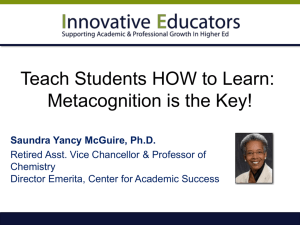
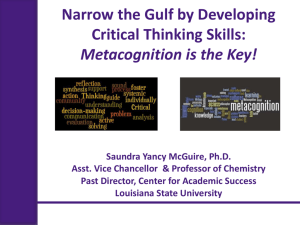
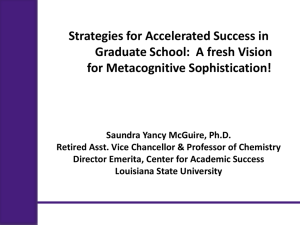
![File [ptx] - Kent State University](http://s3.studylib.net/store/data/009471766_1-c9863c0101d52ef451e19680e4b3f848-300x300.png)
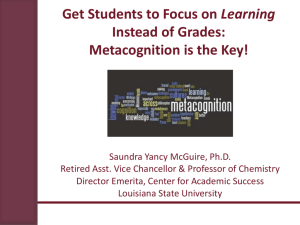
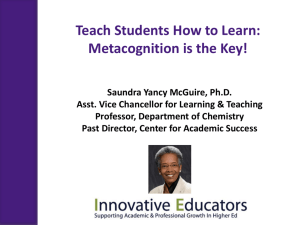
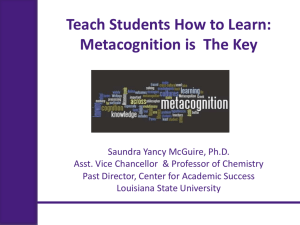
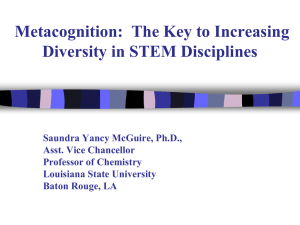
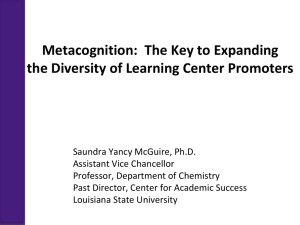
![File [ptx]](http://s3.studylib.net/store/data/009427298_1-8f707a5a5fa6e5d11883ac6bfef16f05-300x300.png)
